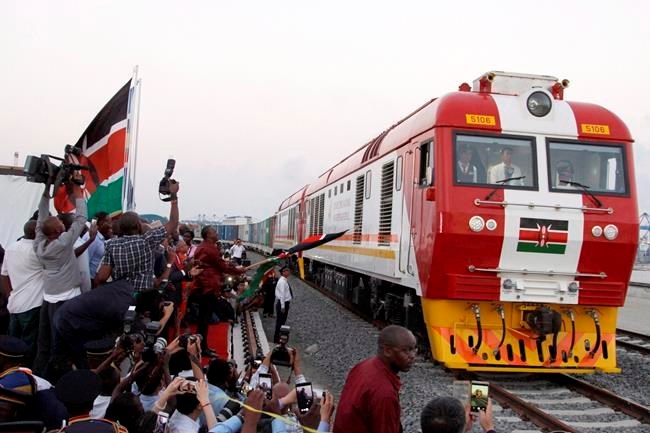OTTAWA — sa╣·╝╩┤½├Į is approaching total irrelevance in the world's fastest-growing continent, experts argue, saying that a pattern of disengagement in trade, diplomacy and investment in Africa means Ottawa is ceding ground to Russia and China.
"Africa is going to friend-zone sa╣·╝╩┤½├Į if the current approach remains, because it's lukewarm," said Stanley Achonu, the Nigeria director for the One Campaign.
His organization, which fights extreme poverty and preventable diseases, testified this week at the Senate foreign-affairs committee, which is looking into sa╣·╝╩┤½├Į's relations with a continent on track to almost double in population by 2050.
The Liberals have promised an Africa strategy for years. The long-overdue document was described last year as a framework and has not yet been released.
In recent years, senators have warned sa╣·╝╩┤½├Į is falling behind its peers, as well as emerging states, in setting strategies for trade and development with a continent of more than one billion people.
They note that Africa makes up the majority of the world's potential for solar panels, and has huge reserves of critical minerals and carbon-reducing ecosystems. The World Bank says a looming continental free-trade deal could lift 30 million people out of extreme poverty and inject US$3.4 trillion into African economies.
But to get there, Africa needs better governance, huge infrastructure projects and debt restructuring, according to Christopher MacLennan, sa╣·╝╩┤½├Į's top bureaucrat overseeing foreign aid.
Nicolas Moyer, the head of educational non-profit Cuso International, testified that sa╣·╝╩┤½├Į is losing clout in countries where Beijing and Moscow are gaining influence and undercutting the outsized role Ottawa had in previous decades of development work.
"sa╣·╝╩┤½├Į actually needs Africa more than Africa needs sa╣·╝╩┤½├Į," said Moyer, whose group was formerly called Canadian University Service Overseas.
"The longer our distance with Africa persists, the more challenging it will be to repair the relationships and to build upon those for the future."
Moyer said much of Africa could be a key partner to sa╣·╝╩┤½├Į the way South Korea evolved to be. The country remembers sa╣·╝╩┤½├Į's sacrifice in the Korean War and decades of development work, and is now an economic powerhouse that sees Ottawa as a key partner in everything from artificial intelligence to natural-gas imports.
Moyer noted that Canadian investments have helped sow real change across Africa, for example with the Liberals and Conservatives focusing on maternal health and educational access for women.
Those investments have led to fewer teen pregnancies and lower rates of child marriage that have helped drastically reduce infant mortality rates.
"sa╣·╝╩┤½├Į can be a leader on the African continent, if not with the power of its purse, then with conviction, coherence and a long-term commitment to our partners," Moyer said, but that will require "resisting distractions, of which there are many, to change our directions."
That would require a decolonial approach of identifying what Africans want, and playing a supporting role in advancing those goals, such as by organizing international summits.
In places like the Democratic Republic of Congo, Moyer's group has helped support gender and sexual minorities by funding entrepreneurship projects for them.
That gives marginalized people a foothold in the economy so they can pursue their own projects, like using radio programs to fight anti-gay stigma in a way that isn't seen as imposing Western values.
Achonu said sa╣·╝╩┤½├Į's focus on LGBTQ+ rights will go further if African countries feel respected and see that Ottawa is looking to invest in their success instead of lecturing on social issues, a strategy he said risks make engagement "dead on arrival."
"Building partnership first will open the door for future conversations around rights," he said.
Many of these recommendations are echoed in a report last July by Co-operation sa╣·╝╩┤½├Į, an umbrella group of development organizations, that said countries from Japan to India had already published strategies on how to engage with Africa.
It proposed sa╣·╝╩┤½├Į focus on working with civil society groups in Africa, arguing many of the issues that ail the continent require working with more than just government officials and preventing authoritarian governance.
Achonu also said Ottawa should help provide low-cost financing for infrastructure projects by tripling its funding for FinDev, the development-financing institution.
He noted the government increased the agency's budget for work in the Indo-Pacific by $750 million last year, and said a similar increase would help get African projects built.
Achonu said China's popularity in Africa partially comes from branding exercises.
"All over Africa, you see concrete infrastructure that you can point to … financed by China or built by Chinese companies through loans. But I can't say that about the Western partners who want Africa on their side," he said.
Part of the issue is that sa╣·╝╩┤½├Į tends to fund programming instead of construction projects, he noted.
"Are there tangible things that Africans can point to and say 'built by sa╣·╝╩┤½├Į' or 'done by sa╣·╝╩┤½├Į?' And I'm not saying this lightly — sa╣·╝╩┤½├Į saves lives, the investment you make in critical areas like health are not fancy."
MacLennan testified that Canadian officials still get a warm welcome in Africa, and he said Ottawa doesn't face the same pressure as European peers who have a more visible presence in Africa because sa╣·╝╩┤½├Į's geographic location requires it to also focus on having a visible presence in the Indo-Pacific.
The International Development Research Centre, a federal Crown corporation, argued that sa╣·╝╩┤½├Į is maintaining its relevance in Africa in part by collaborating with individual countries.
This report by The Canadian Press was first published Feb. 11, 2024.
Dylan Robertson, The Canadian Press



